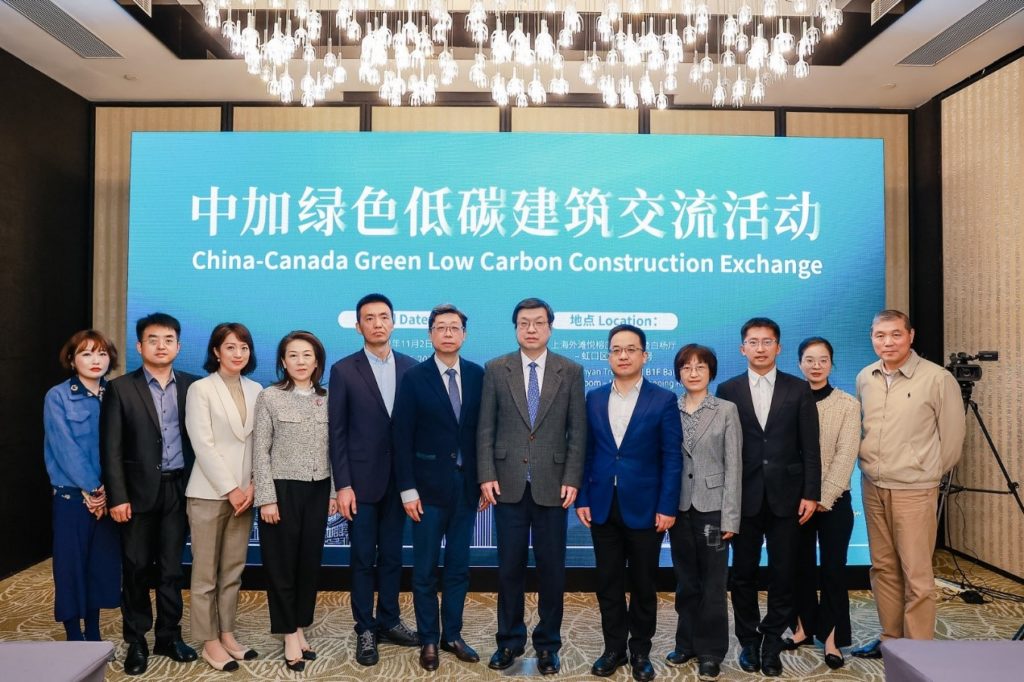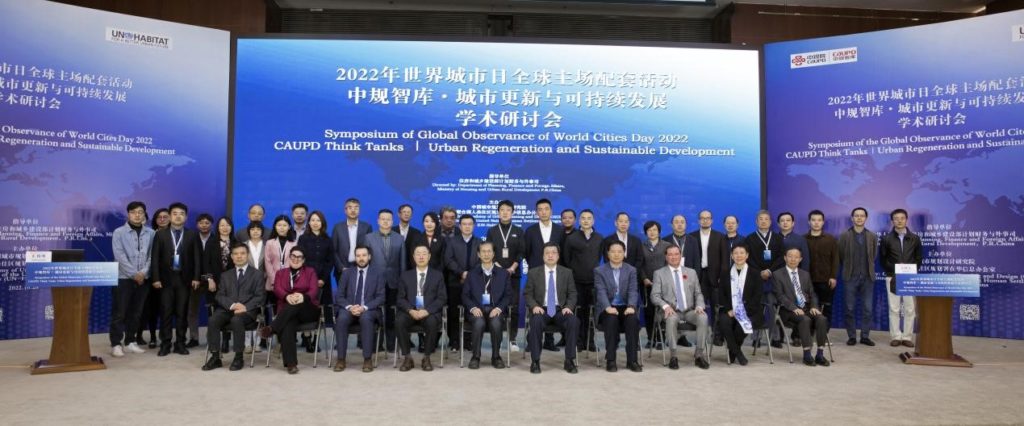FII China aligns outreach activities with World Cities Day

The global celebration of the 2022 World Cities Day returned to Shanghai, where it was first launched in 2014. With the theme of “Act Local to Go Global,” the World Cities Day was co-hosted by the Ministry of Housing and Urban-Rural Development (MOHURD), the Shanghai Municipal Government and the United Nations Human Settlements Program, with an opening ceremony held on October 31. World Cities Day was initiated by the government of China with support of the international community through the UN. The concept originated from the 2010 Shanghai World Expo, which had the theme of “Better City, Better Life.”
The President of the People’s Republic of China, Xi Jinping, sent a congratulatory letter to the opening ceremony of this event, where he stated that the global observance of World Cities Day adheres to promoting the sustainable development of global cities and is of great significance for international efforts to develop an inclusive, balanced and coordinated development pattern that features win-win cooperation and mutual prosperity.

A roundtable focused on bilateral collaborations within the construction sector was hosted by FII China as a parallel event to the World Cities Day program in Shanghai, with the “China-Canada Green Low Carbon Construction Exchange” held on November 2. More than 20 high-level stakeholders participated online and offline, with central level representatives of MOHURD, as well as the provincial MOHURD and FAO officials from Jiangsu, Hubei, and Zhejiang, along with municipal representatives of Shanghai.
These representatives have been important partners for FII China’s cooperative programs in recent years, recognizing the environmental advantages of wood construction. The roundtable was organized as an opportunity to share recommendations for future cooperation across the Yangtze River Delta and surrounding region, as well as provide insights on low carbon construction advancements such as Mass Timber technologies.
Mr. Li Zhe, Deputy Director General from MOHURD’s Department of Planning, Finance, and Foreign Affairs, Ms. Zhang Xiaomei, Director General of Hubei Foreign Affairs Office, Mr. Liu Jiandong, Deputy Director General of Jiangsu Foreign Affairs Office, and Mr. Liu Qian Wei, Chief Engineer of Shanghai MOHURD, all emphasized the crucial role wood construction can play in achieving the goals of carbon peak and carbon neutrality and building sustainable cities and welcomed cooperation with FII China in those respects.
In concluding the roundtable, FII China referenced the theme to “Act Local to go Global” to reinforce a commitment to promoting wood construction technology and taking lessons from the event to act locally at our organization to contribute to global efforts to mitigate climate change and support a sustainable future.
The success of this exchange offered encouragement for the significance of FII China’s programs. The World Cities Day events took place amidst rigorous COVID restrictions, and despite so, key partners put in great efforts to attend and support the events with senior level representation. This demonstrates that the quality of work that FII China has shown in past initiatives has been recognized by local partners, where they feel confident that it is worth the effort to coordinate their participation. Inviting key stakeholders from national and provincial authorities creates an extraordinary opportunity for communications, not only demonstrating engagement across all levels of government, but also offering more insights for future cooperation programs, with shared discussions between different levels of government offering feedback on potential projects to deliver and topics to cover.

With MOHURD as the main sponsor of the program for World Cities Day, FII also had the honour of being invited to support multiple events. As one of the first associated activities, a symposium was held in Beijing on October 28, co-sponsored by the China Academy of Urban Planning and Design (CAUPD) and the Information Office of the UN Human Settlements Program in China. The theme of this event was “Urban Regeneration and Sustainable Development,” bringing together officials and academics from global think tanks. As China enters a new era of prioritizing ecological conservation, this symposium featured discussions on recent trends and long-term outlooks for sustainable urban development. FII China coordinated the participation of Francis Huot, Commercial Counsellor and Senior Trade Commissioner of the Embassy of Canada to China, who joined a panel discussion on global best practices, with other speakers at the symposium including Yang Baojun, the Chief Economist of MOHURD, Zhang Zhenshan, the UN-Habitat Program Manager for China, Ma Jun, Senior Fellow of the Chinese Academy of Engineering, and Wang Kai, President of CAUPD.

As the World Cities Program opened in Shanghai, a thematic forum was held on November 1, with the “International Forum on Science and Technology Innovation for Green and Low Carbon City Construction.” This session was sponsored by the Science and Technology and Industrialization Development Center of MOHURD, along with the support of the China Construction Science and Technology Group, and the Management Committee of the Local Economic and Trade Cooperation Demonstration Zone of the China-Shanghai Cooperation Organization. Through discussions with MOHURD, FII China and the Canadian Embassy in Beijing were invited to participate as an official partner of this forum, which was coordinated by the Consulate of Canada in Shanghai with Consul General Dave Murphy delivering a keynote speech, along with Eric Wong, Managing Director of Canada Wood China giving a presentation on wood demonstration projects and Eco-District collaborations between the two countries.
The event witnessed the participation of senior officials from MOHURD, the Industrialization Development Center of MOHURD, and the Municipal Housing and Urban Rural Construction Management Commission. Many leading experts and enterprise representatives shared their perspectives on the scientific and technological innovation for building low-carbon cities, expanding green and blue urban areas, and green building solutions. The forum was also used as a platform for the public release of the Research Report on Green Building Development, the Green Building Network, and the Green Building Design Guidelines.

FII China was also invited to be a strategic partner of a second session on November 1, with the 2022 International Cities and Construction Industry Forum, which was sponsored by the Foreign Affairs Department of MOHURD and co-hosted by the Construction Industry Branch of the China Council for the Promotion of International Trade (CCPIT) and the Shanghai branch of MOHURD.
Focused on the theme of “Urban Renewal & Industry Initiative,” government officials, industry experts, academic scholars and company executives shared the latest achievements and case studies for the implementation of urban renewal and sustainable development. These examples covered best practices and analytical feedback on projects in the field of green and low-carbon development. The forum also featured a panel discussion on “Urban Renewal and Urban-Rural Linkage,” which began with the public release of the Case Study Report on Urban Renewal and Rural Revitalization. The Canada Wood demo project Yangxin Pear Garden Tourism Service Center was selected as one of the 13 best cases studies for Rural Revitalization in China that were featured in this report.
On behalf of FII China, Yike Qin joined the panel discussion and spoke on key trends within urban renewal and rural revitalization. Discussing natural materials and low-carbon building solutions, the panel agreed that modern wood structures are a reliable way to implement technical systems in rural construction. The panel moderator and the Dean of Zhejiang Urban Planning Institute concluded that wood structures have many advantages in heat preservation, energy conservation, environmental protection, and the reduction of construction waste. It was acknowledged that wood is also a good way to sequester carbon, which offers a significant contribution to the efforts to mitigate climate change. Through the discussions at this session, there was an optimistic outlook for the possibilities of having more rural buildings built using wood, and for China’s domestic forest products to see greater utilization in rural revitalization.
Altogether, the events organized for the World Cities Day program were a substantial opportunity to engage with senior level officials responsible for development planning and construction policies in China. A consistent theme throughout the program was the significance of establishing a low-carbon, sustainable model for both urban and rural development. The role that FII China had across four separate events demonstrated the strength of the relationships that have been established with local stakeholders, and also the opportunities to work closer with those partners to advance the promotion of low carbon development and wood building solutions in China.


